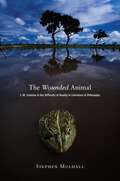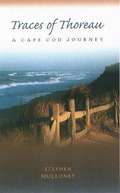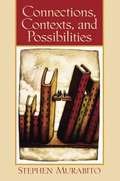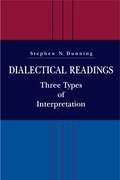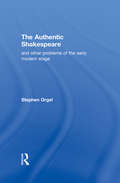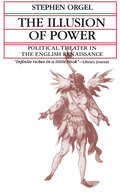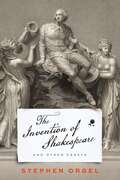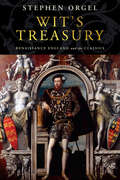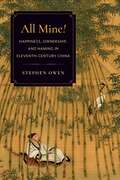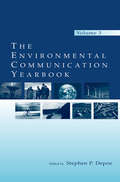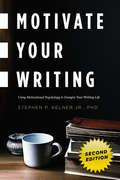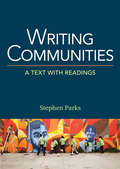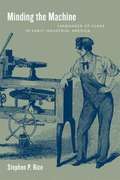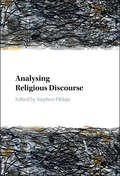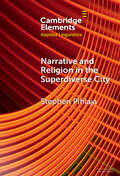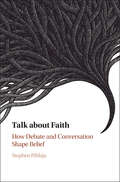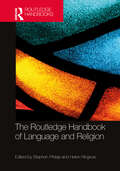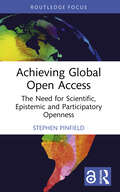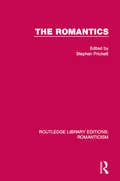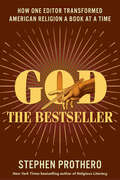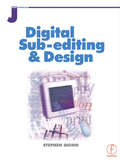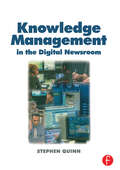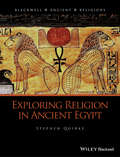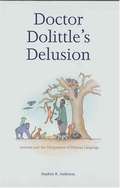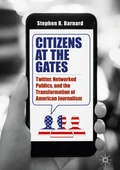- Table View
- List View
The Wounded Animal: J. M. Coetzee and the Difficulty of Reality in Literature and Philosophy
by Stephen MulhallIn 1997, the Nobel Prize-winning novelist J. M. Coetzee, invited to Princeton University to lecture on the moral status of animals, read a work of fiction about an eminent novelist, Elizabeth Costello, invited to lecture on the moral status of animals at an American college. Coetzee's lectures were published in 1999 as The Lives of Animals, and reappeared in 2003 as part of his novel Elizabeth Costello; and both lectures and novel have attracted the critical attention of a number of influential philosophers--including Peter Singer, Cora Diamond, Stanley Cavell, and John McDowell. In The Wounded Animal, Stephen Mulhall closely examines Coetzee's writings about Costello, and the ways in which philosophers have responded to them, focusing in particular on their powerful presentation of both literature and philosophy as seeking, and failing, to represent reality--in part because of reality's resistance to such projects of understanding, but also because of philosophy's unwillingness to learn from literature how best to acknowledge that resistance. In so doing, Mulhall is led to consider the relations among reason, language, and the imagination, as well as more specific ethical issues concerning the moral status of animals, the meaning of mortality, the nature of evil, and the demands of religion. The ancient quarrel between philosophy and literature here displays undiminished vigor and renewed significance.
Traces of Thoreau: A Cape Cod Journey
by Stephen MulloneyThe contemporary companion to Henry David Thoreau's classic Cape Cod.
Connections, Contexts, and Possibilities
by Stephen MurabitoPart rhetoric and part reader, the text is filled with practical guidelines designed to help students develop and intensify their thinking, reading, and writing abilities.
Dialectical Readings: Three Types of Interpretations
by Stephen N. DunningInterpretation pervades human thinking. Whether perception or experience, spoken word or written theory, whatever enters our consciousness must be interpreted in order to be understood. Every area of inquiry—art and literature, philosophy and religion, history and the social sciences, even many aspects of the natural sciences—involves countless opportunities to interpret the object of inquiry according to very different paradigms. These paradigms may derive from the language we speak, the nature of our education, or personal preferences. The abundance and diversity of paradigms make interpretation both fascinating in its complexity and often frustrating for the conflicts it generates. In Dialectical Readings, Dunning distinguishes three types of interpretation, each defined in terms of a distinctive dialectical way of thinking: theoretical interpretation, which assumes binary oppositions; transactional interpretation, which seeks reciprocal relations; and transformational interpretation, which discerns paradoxical meanings. Dunning offers new and insightful readings of familiar texts by B. F. Skinner, Claude Lévi-Strauss, Lee Benson, Roland Barthes, Friedrich Nietzsche, and Michel Foucault and sheds new light on works by Thomas Kuhn, Joseph Campbell, Reinhold Niebuhr, Søren Kierkegaard, Paul Tillich, and Paul Ricoeur. Dialectical Readings enables readers to recognize diverse dialectical approaches to understanding—their own as well as those of others—in a way that provides new and helpful insights into a wide variety of subjects in which conflicting interpretations abound.
The Authentic Shakespeare: and Other Problems of the Early Modern Stage
by Stephen OrgelFirst published in 2003. Routledge is an imprint of Taylor & Francis, an informa company.
The Illusion of Power: Political Theater in the English Renaissance
by Stephen Orgel"Elegant, deeply learned, and intellectually adventurous, its implications extend far beyond the boundaries of the Stuart and Caroline masque. It is an indispensable, exploration of political art and aestheticized politics. . . . a classic."--Stephen Greenblatt, University of California, Berkeley "A triumph of scholarship, insight, and explication, Oregel's book is truly a classic in the field of Renaissance studies. Anyone interested in Renaissance culture will find here a masterful analysis of its celebration of royal power."--Coppelia Kahn, Brown University "As knowing of art, theatrical and political history as it is sensitive to poetry, Orgel's book is learned, lively, and beautifully clear."--John Hollander, Yale University "A foundational text for the New Historicist Perspective in English Renaissance literary and cultural studies . . . as informative and suggestive as it was when new; in the clarity and grace of its writing, the breadth and precision of its arguments, the aptness and resonance of its examples, it is unsurpassed as an introduction to the dialectic of theatrical illusion and state authority--of play and power--in the culture of Elizabethan and Stuart England."--Louis Montrose, University of California, San Diego
The Invention of Shakespeare, and Other Essays
by Stephen OrgelIn his own time, Shakespeare was not a monument, but a man of the theater whose plays were less finished artifacts than works in process. In contrast to a book, a thing we have come to think of as final and achieved, a play is a work for performance, with each performance based only in part on a text we call a script. That script may well have had imperfections that the actors may or may not have noticed as they turned it into a performance. There were multiple versions of the scripts and never a "final" one. Every revival of a play—indeed, every subsequent performance—was and always will be different. Nevertheless, when we study Shakespeare, we are likely to come to him via printed texts that are scripts masquerading as books, and the impulse is to turn them into finished artifacts worthy of their author's dignity.In The Invention of Shakespeare, and Other Essays Stephen Orgel brings together twelve essays that consider the complex nature of Shakespearean texts, which often include errors or confusions, and the editorial and interpretive strategies for dealing with them in commentary or performance. "There is always some underlying claim that we are getting back to 'what Shakespeare actually wrote,'" Orgel writes, "but obviously that is not true: we clarify, we modernize, we undo muddles, we correct or explain (or explain away) errors, all in the interests of getting a clear, readable, unproblematic text. In short, we produce the text that we want him to, or think he must have written. But one thing we really do know about Shakespeare's original text is that it was hard to read."
Wit's Treasury: Renaissance England and the Classics
by Stephen OrgelAs England entered the Renaissance and as humanism, with its focus on classical literature and philosophy, informed the educational system, English intellectuals engaged in a concerted effort to remake the culture, language, manners—indeed, the whole national style—through adapting the classics. But how could English literature, art, and culture, become "classical," not only in imitating the ancients, but in the sense subsequently applied to music: "classical" as opposed to popular, as formal, serious, and therefore as good?For several decades in the sixteenth and early seventeenth centuries, Stephen Orgel writes, the return to the classics held out the promise of refinement and civility. Poetry was to be modeled on Greek and Roman examples rather than on the great English medieval works, which though admirable, lacked "correctness." More than poetry was at stake, however, and the transition would not be easy. Classical rules seemed the wave of the future, rescuing England from what was seen as the crudeness and the sheer popularity of its native traditions, but advocacy was tempered with a good deal of ambivalence: classical manners and morals were often at variance with Christian principles, and the classicism of the age would need to be deeply revisionist. "Christian humanism" was never untroubled, Orgel writes, always an unstable or even paradoxical amalgam.In Wit's Treasury, one of our foremost interpreters of Renaissance literature and culture charts how this ambivalence yielded the rich creative tension out of which emerged an unprecedented flowering of drama, lyric, and the arts. Orgel has here written a book that will appeal to anyone interested in English Renaissance art and literature, and particularly in the cultural ferment that produced Shakespeare, Marlowe, Spenser, Jonson, and Milton.
All Mine!: Happiness, Ownership, and Naming in Eleventh-Century China
by Stephen OwenUnder the Song Dynasty, China experienced rapid commercial growth and monetization of the economy. In the same period, the austere ethical turn that led to neo-Confucianism was becoming increasingly prevalent in the imperial bureaucracy and literati culture. Tracing the influences of these trends in Chinese intellectual history, All Mine! explores the varied ways in which eleventh-century writers worked through the conflicting values of this new world.Stephen Owen contends that in the new money economy of the Song, writers became preoccupied with the question of whether material things can bring happiness. Key thinkers returned to this problem, weighing the conflicting influences of worldly possessions and material comfort against Confucian ideology, which locates true contentment in the Way and disdains attachment to things. In a series of essays, Owen examines the works of writers such as the prose master Ouyang Xiu, who asked whether tranquility could be found in the backwater to which he had been exiled; the poet and essayist Su Dongpo, who was put on trial for slandering the emperor; and the historian Sima Guang, whose private garden elicited reflections on private ownership. Through strikingly original readings of major eleventh-century figures, All Mine! inquires not only into the material conditions of happiness but also the broader conditions of knowledge.
The Environmental Communication Yearbook: Volume 3
by Stephen P. DepoeFirst Published in 2006. For scholars and students in environmental communications, journalism, rhetoric, PR, mass communication and other related areas.
Motivate Your Writing: Using Motivational Psychology to Energize Your Writing Life
by Stephen P. Kelner Jr.Energize and organize your writing life by tapping into your fundamental motivators.Note: This second edition has been substantially revised and updated, including 10% more content than the first edition.Aspiring and professional writers alike struggle to stay motivated; in the face of distractions, obligations, and procrastination, the desire to write often fails to become the act of writing. Motivated writers, notes the author, are those who have learned to identify their fundamental emotional drives and who have established a writing routine that satisfies those drives. Kelner draws on the research and insights of motivational psychology to show writers how to harness the energy of these fundamental motivators. With a degree in motivational psychology, Kelner applies not only his training in the field but also his own original research into the motivational patterns typical of writers. Depending on their motivational profile, different writers will respond best to different kinds of feedback and rewards and will function best in different kinds of environments. Kelner explains the basic drives of power, affiliation, and achievement; he shows how these drives are manifested in a wide variety of behaviors; and he provides self-assessment tools to construct your own motivational profile. In clear and accessible terms, and with numerous examples and anecdotes, Kelner shows writers how they can identify their own primary motivations and use that knowledge to arrange their work habits and energize their writing lives.
Writing Communities
by Stephen ParksWriting Communities is an exciting new text and reader that connects students to neighborhoods and writing courses to communities. Part One introduces students to academic reading and writing skills and prompts them to examine how their communities influence their writing. Part Two then shows students how their academic reading and writing skills can serve as a bridge into working--and producing writing--with the community. The text promotes involvement in and advocacy of social issues such as education, housing, and cultural justice, and assignments provide students with opportunities to put concepts into practice, such as setting up community writing groups, hosting events, and producing publications. A rich variety of readings ranging from personal narratives and poetry to essays and educational scholarship help show students the myriad ways in which writing makes things happen in the world. The skills students learn from Writing Communities will prepare them for any collaborative work they may take on--in any community they may be a part of--in college and beyond.
Minding the Machine: Languages of Class in Early Industrial America
by Stephen Patrick RiceIn this innovative book, Stephen P. Rice offers a new understanding of class formation in America during the several decades before the Civil War. This was the period in the nation's early industrial development when travel by steamboat became commonplace, when the railroad altered concepts of space and time, and when Americans experienced the beginnings of factory production. These disorienting changes raised a host of questions about what machinery would accomplish. Would it promote equality or widen the distance between rich and poor? Among the most contentious questions were those focusing on the social consequences of mechanization: while machine enthusiasts touted the extent to which machines would free workers from toil, others pointed out that people needed to tend machines, and that that work was fundamentally degrading and exploitative. Minding the Machine shows how members of a new middle class laid claim to their social authority and minimized the potential for class conflict by playing out class relations on less contested social and technical terrains. As they did so, they defined relations between shopowners--and the overseers, foremen, or managers they employed--and wage workers as analogous to relations between head and hand, between mind and body, and between human and machine. Rice presents fascinating discussions of the mechanics' institute movement, the manual labor school movement, popular physiology reformers, and efforts to solve the seemingly intractable problem of steam boiler explosions. His eloquent narrative demonstrates that class is as much about the comprehension of social relations as it is about the making of social relations, and that class formation needs to be understood not only as a social struggle but as a conceptual struggle.
Analysing Religious Discourse
by Stephen PihlajaLanguage plays a key role in religion, framing how people describe spiritual experience and giving structure to religious beliefs and practices. Bringing together work from a team of world-renowned scholars, this volume introduces contemporary research on religious discourse from a variety of theoretical and methodological perspectives. It introduces methods for analysis of a range of different kinds of text and talk, including institutional discourse within organised religions, discourse around spirituality and spiritual experience within religious communities, media discourse about the role of religion and spirituality in society, translations of sacred texts, political discourse, and ritual language. Engaging and easy-to-read, it is accessible to researchers across linguistics, religious studies, and other related disciplines. A comprehensive introduction to all the major research approaches to religious language, it will become a key resource in the emerging inter-disciplinary field of language and religion.
Narrative and Religion in the Superdiverse City (Elements in Applied Linguistics)
by Stephen PihlajaThis Element focuses on how narrative is used to construct religious identity in superdiverse contexts, considering specifically how people talk about their own religious identity, and the religious identity of others. Drawing on interviews with twenty-five participants, and numerous site visits throughout the city of Birmingham (UK), the analysis focuses on how self and other positioning is used to construct religious identity in talk about beliefs, actions, and behaviours in different contexts. Additionally, the analysis shows how conflict emerges and is resolved in spaces where people of different faiths and no faith interact, and how people talk about and understand community. Finally, a model for talking about faith in diverse contexts is presented to help people find common goals and act together towards shared interests.
Talk about Faith: How Debate and Conversation Shape Belief
by Stephen PihlajaHow do people of faith use language to position themselves, and their beliefs and practices, in the contemporary world? This pioneering and original study looks closely at how Christians and Muslims talk to people inside and outside of their own communities about what they think are the right things to believe and do. From debates, to podcasts and YouTube videos, the book covers a range of engaging texts and contexts, showing how doctrine and beliefs are not nearly as fixed and static as we might think, and that people are prone to change what they say they believe, depending on who they are talking to. From abortion, to hell, to whether it's okay to sell alcohol, Pihlaja investigates how Christians and Muslims struggle with different elements of their own faith, and try to make decisions about what to do when there are so many different voices to believe.
The Routledge Handbook of Language and Religion (Routledge Handbooks in Linguistics)
by Stephen PihlajaThe Routledge Handbook of Language and Religion is the first ever comprehensive collection of research on religion and language, with over 35 authors from 15 countries, presenting a range of linguistic and discourse analytic research on religion and belief in different discourse contexts. The contributions show the importance of studying language and religion and for bringing together work in this area across sub-disciplines, languages, cultures, and geographical boundaries. The Handbook focuses on three major topics: Religious and Sacred Language, Institutional Discourse, and Religious Identity and Community. Scholars from a variety of different disciplinary backgrounds investigate these topics using a range of linguistic perspectives including Cognitive Linguistics, Discourse Analysis, Sociolinguistics, Pragmatics, and Conversation Analysis. The data analysed in these chapters come from a variety of religious backgrounds and national contexts. Linguistic data from all the major world religions are included, with sacred texts, conversational data, and institutional texts included for analysis. The Handbook is intended to be useful for readers from different subdisciplines within linguistics, but also to researchers working in other disciplines including philosophy, theology, and sociology. Each chapter gives both a template for research approaches and suggestions for future research and will inspire readers at every stage of their career.
Achieving Global Open Access: The Need for Scientific, Epistemic and Participatory Openness (Routledge Critical Studies on Open Access)
by Stephen PinfieldAchieving Global Open Access explores some of the key conditions that are necessary to deliver global Open Access (OA) that is effective and equitable.Often assumed to be a self-evident good, OA has been subject to growing criticism for perpetuating global inequities and epistemic injustices. It has been seen as imposing exploitative business and publishing models and as exacerbating exclusionary research evaluation cultures and practices. Pinfield engages with these issues, recognising that the global OA debate is now not just about publishing business models and academic reward structures, but also about what constitutes valid and valuable knowledge, how we know, and who gets to say. The book argues that, for OA to deliver its potential, it first needs to be associated with ‘epistemic openness’, a wider and more inclusive understanding of what constitutes valid and valuable knowledge. It also needs to be accompanied by ‘participatory openness’, enabling contributions to knowledge from more diverse communities. Interacting with relevant theory and current practice, the book discusses the challenges in implementing these different forms of openness, the relationships between them, and their limits.Achieving Global Open Access is essential reading for academics and students engaged in the study of Library and Information Science, Open Access and Publishing. It will also be valuable and interesting to library and publishing professionals around the world.
The Romantics: The Context Of English Literature (Routledge Library Editions: Romanticism #24)
by Stephen PrickettFirst published in 1981. This book aims to show Romanticism as a response to certain questions – in literature, art, religion, philosophy and politics – that were being asked increasingly towards the end of the eighteenth century. The essays focus on growth and change (in society and the individual), nature, feeling and reason, and subjectivism – examining how these questions arose, why they were felt to be important and the kinds of answers that, consciously or unconsciously, the Romantics provided. This title will be of interest to students of literature, history and philosophy.
God the Bestseller: How One Editor Transformed American Religion a Book at a Time
by Stephen ProtheroNew York Times bestselling author and acclaimed religion scholar, Stephen Prothero, captures the compelling and unique saga of twentieth-century America on an identity quest through the eyes and books of one of the most influential editors of the day—a search, born of two world wars, for resolution of our divided identity as a Christian nation and a nation of religions.One summer evening in 1916 in Blanchester, Ohio, a sixteen-year-old farm boy was riding his horse past the town cemetery. The horse reared back and whinnied, and Eugene Exman saw God. For the rest of his life, he struggled to recreate that moment. Through a treasure of personal letters and papers, God, the Bestseller explores Exman’s personal quest. A journey that would lead him in the late 1920s to the Harper religious books department, which he turned during the Great Depression into a money-making juggernaut and the country’s top religion publisher. Exman’s role in the shaping of American religion is undeniable. Here was a man who was ahead of his time and leading the rest of the nation through books on a spiritual exploration. Exman published bestsellers by the controversial preacher Harry Emerson Fosdick, the Catholic radical Dorothy Day, the Civil Rights pioneer Howard Thurman, and two Nobel laureates: Albert Schweitzer and Martin Luther King Jr. Exman did not just sit at a desk and read. In addition to his lifelong relationships with the most influential leaders of the day, Exman was on a spiritual journey of his own traversing the world in search of God. He founded a club of mystics, dropped acid in 1958, four years before Timothy Leary. And six years before The Beatles went to India, he found a guru there in 1962. In the end, this is the story of the popularization of the religion of experience—a cultural story of modern America on a quest of its own. Exman helped to reimagine and remake American religion, turning the United States into a place where denominational boundaries are blurred, diversity is valued, and the only creed is that individual spiritual experience is the essence of religion.
Digital Sub-Editing and Design
by Stephen QuinnThis excellent book covers editing in the digital age, demonstrating the tools needed for effective text editing. Learn how to write powerful headlines and captions, and how to edit body text quickly and cleanly. It also concentrates on design in the digital environment, introducing typography and the related issues of readability and legibility. The skills of picture editing are explored, including image selection, cropping, manipulation and the ethics involved. These core skills and methods are then applied to the World Wide Web. Recent research into how people navigate Web pages is considered, and recommends ways to write more effectively for the online medium. The first section concentrates on editing in the digital age, demonstrating the tools needed for effective text editing. Dr Quinn shows how to write powerful headlines and captions, and how to edit body text quickly and cleanly. The middle section concentrates on design in the digital environment. Chapter five introduces typography and the related issues of readability and legibility. Chapter six covers the principles of design and how they can be applied to print and electronic publications. Chapter seven looks at the skills of picture editing, including image selection, cropping, manipulation and the ethics involved. Chapter eight investigates other forms of visual presentation such as diagrams, logos, maps and cartoons. In the final section, these core skills and methods are applied to the World Wide Web. Chapter nine considers recent research into how people navigate Web pages, and recommends ways to write more effectively for the online medium. Chapter ten examines how the principles of print design can (and cannot) be applied to Web pages.
Knowledge Management in the Digital Newsroom
by Stephen QuinnIf you are an editor or newsroom manager seeking new and more efficient ways of managing the ever increasing flow of information through your newsroom, this book will provide the information you need to make informed decisions about crucial organisational and equipment changes. Case studies from newsrooms worldwide are used to present an overview of the information management tools and processes that are available to help journalists and media executives deal with information. Answers are suggested for some of the most pressing issues, including:What are the factors driving change in newsrooms?How are news organizations around the world re-organising their newsrooms to deal with information in new ways?How are the opposing needs to cut costs and yet maintain journalistic quality being met?What digital tools are currently available, e.g. for computer-assisted reporting?How can reporters become more mobile?How can trainee journalists be better prepared for operating within the changing newsroom environment?Each chapter is supplemented by a 'how to learn more' section, suggesting further resources for tackling each issue. Whether you are planning major change in your newsroom or simply wish to keep up with the latest industry trends, this is the book you have been waiting for.
Exploring Religion in Ancient Egypt (Blackwell Ancient Religions)
by Stephen QuirkeExploring Religion in Ancient Egypt offers a stimulating overview of the study of ancient Egyptian religion by examining research drawn from beyond the customary boundaries of Egyptology and shedding new light on entrenched assumptions. Discusses the evolution of religion in ancient Egypt – a belief system that endured for 3,000 years Dispels several modern preconceptions about ancient Egyptian religious practices Reveals how people in ancient Egypt struggled to secure well-being in the present life and the afterlife
Doctor Dolittle’s Delusion: Animals and the Uniqueness of Human Language
by Stephen R. AndersonCan animals be taught a human language and use it to communicate? Or is human language unique to human beings, just as many complex behaviors of other species are uniquely theirs? This engrossing book explores communication and cognition in animals and humans from a linguistic point of view and asserts that animals are not capable of acquiring or using human language. Stephen R. Anderson explains what is meant by communication, the difference between communication and language, and the essential characteristics of language. Next he examines a variety of animal communication systems, including bee dances, frog vocalizations, bird songs, and alarm calls and other vocal, gestural, and olfactory communication among primates. Anderson then compares these to human language, including signed languages used by the deaf. Arguing that attempts to teach human languages or their equivalents to the great apes have not succeeded in demonstrating linguistic abilities in nonhuman species, he concludes that animal communication systems--intriguing and varied though they may be--do not include all the essential properties of human language. Animals can communicate, but they can't talk.
Citizens at the Gates: Twitter, Networked Publics, and the Transformation of American Journalism
by Stephen R. BarnardDrawing insights from nearly a decade of mixed-method research, Stephen R. Barnard analyzes Twitter’s role in the transformation of American journalism. As the work of media professionals grows increasingly hybrid, Twitter has become an essential space where information is shared, reporting methods tested, and power contested. In addition to spelling opportunity for citizen media activism, the normalization of digital communication adds new channels of influence for traditional thought leaders, posing notable challenges for the future of journalism and democracy. In his analyses of Twitter practices around newsworthy events—including the Boston Marathon bombing, protests in Ferguson, Missouri, and the election of Donald Trump—Barnard brings together conceptual and theoretical lenses from multiple academic disciplines, bridging sociology, journalism, communication, media studies, science and technology studies, and political science.
